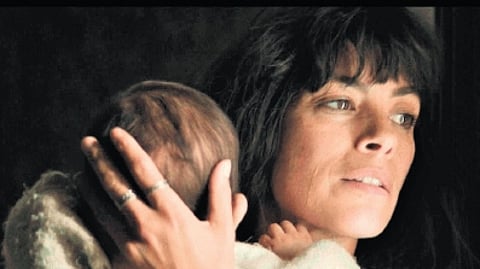

With the Paris Olympics having just concluded, a topic that often came up for discussion was to do with the inescapable blend of sports and politics. In his latest film, Mexico 86, Belgian-Guatemalan filmmaker Cesar Diaz consciously chooses the 1986 FIFA World Cup held in Mexico as a backdrop to tell a trenchant story—a mix of fact and fiction—about the resistance against the corrupt and violent Guatemalan military dictatorship of the day. However, more than that, the 1986 World Cup, which has gone down in history for Argentina’s unhindered victory, Diego Maradona’s “Hand of God” goal and the spectators’ Mexican Wave, also becomes a playground to unspool an affecting mother-son saga. A case of the lows of the human struggles for liberty, equality, justice, solidarity, and fraternity on the one hand and the highs of sporting achievement, familial bonds, and togetherness on the other.
The film, which premiered recently at the ongoing Locarno Film Festival, is Diaz’s tribute of sorts to his revolutionary mother, who was part of the armed struggle to bring about a political, economic, and social transformation in Guatemala. For such dedicated activists “there is often no room to fulfil their roles as parents”, writes Diaz in his director’s note. His protagonist Maria (Berenice Bejo) doesn’t either. Facing death threats at home, the rebel flees to Mexico leaving behind an infant son in the care of her mother. Ten years later, when Marco (Matheo Labbe) comes to live with her and her partner in crime Miguel (Leonardo Ortizgris), she finds her professional commitments as a rebel coming in the way of her personal responsibilities as a mother and vice versa. What side then would she pick to be on? How would she resolve these contradictions on which her life is built?
She refuses to let him go back to her old and ailing mother. But will she have the time to tend to him when he falls sick? Will she be able to make up for the lost time when it comes to filling up the large, gaping holes of her absence from his life? Will they be able to stay together in this life or will their journeys continue to run parallel? Diaz was himself born in the thick of the Civil War in Guatemala and his mother went into exile to Mexico when he was three. Much of the film is rooted in the real, the immediacy of his own experience.
Diaz gives us some significant details like the hives in Cuba and Nicaragua that the children of revolutionaries were often sent off to, for care, safety, and protection.
He narrates it like an efficient, tension-filled thriller, keeping the viewers on the edge with the twists and turns in the clandestine, underground life of Maria, her covert operatives and assumed identities. A car chase, shootout and assassination on the streets are well filmed and period details are recreated effectively.
It’s a tale of unwavering commitment to a larger social cause at the cost of familial estrangement. However, the film fails to make the viewers plunge into the depths of feelings and complexities inherent in the situation. For large parts, one remains aloof and distant, strangely unempathetic to the fraught relationships and human sentiments. In much the same way the performances are consistently adept but fall short of hitting the more profound and poignant notes.
There are just some odd moments—few and far between—that throb with urgency and emotions. Like the scene where Miguel calls for giving up on the fight for equality and justice and expresses the desire to seek a new life of peace away from the turmoil? Maria’s retort is telling—what then happens to our ideals? Somebody must suffer and sacrifice for the greater good. And that includes not just mothers like Maria but sons like Marco as well.